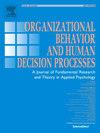当不那么自信的预测预示着更多的专业知识时
IF 3.8
2区 管理学
Q2 MANAGEMENT
Organizational Behavior and Human Decision Processes
Pub Date : 2025-07-16
DOI:10.1016/j.obhdp.2025.104431
引用次数: 0
摘要
信心启发式表明,人们从表现出更高信心的预测者那里推断出更高的专业知识。在目前的研究中,我们确定了两个关键条件下,这种启发式打破,甚至逆转。首先,我们发现认知反思起着调节作用:较少反思的思考者(通过认知反思测试测量;Frederick 2005)将高度自信解释为专业知识的标志,而更多的反思者倾向于将其视为无能的信号-除非上下文线索表明高度情境确定性。我们在对单个预测者的评估和预测者之间的选择中都证明了这种逆转。其次,我们表明,当顾问做出多个预测时,他们表达的信心的可变性可以作为专业知识的额外线索。因此,投资顾问甚至可以通过降低他们的平均信心而增加变异性来显得更专业。我们为这些影响在不同领域提供了证据,包括财务建议、产品性能和运动结果。本文章由计算机程序翻译,如有差异,请以英文原文为准。
When less confident forecasts signal more expertise
The confidence heuristic indicates that people infer greater expertise from forecasters who express higher confidence. In the present research, we identify two key conditions under which this heuristic breaks down and even reverses. First, we find that cognitive reflection plays a moderating role: less reflective thinkers (as measured by the Cognitive Reflection Test; Frederick 2005) interpret high confidence as a sign of expertise, whereas more reflective thinkers tend to view it as a signal of incompetence—unless contextual cues suggest high situational certainty. We demonstrate this reversal in both evaluations of a single forecaster and choices between forecasters. Second, we show that when advisors make multiple predictions, variability in their expressed confidence serves as an additional cue to expertise. As a result, advisors can even appear more expert by lowering their average confidence while increasing the variability. We provide evidence for these effects across diverse domains, including financial advice, product performance, and sports outcomes.
求助全文
通过发布文献求助,成功后即可免费获取论文全文。
去求助
来源期刊
CiteScore
8.90
自引率
4.30%
发文量
68
期刊介绍:
Organizational Behavior and Human Decision Processes publishes fundamental research in organizational behavior, organizational psychology, and human cognition, judgment, and decision-making. The journal features articles that present original empirical research, theory development, meta-analysis, and methodological advancements relevant to the substantive domains served by the journal. Topics covered by the journal include perception, cognition, judgment, attitudes, emotion, well-being, motivation, choice, and performance. We are interested in articles that investigate these topics as they pertain to individuals, dyads, groups, and other social collectives. For each topic, we place a premium on articles that make fundamental and substantial contributions to understanding psychological processes relevant to human attitudes, cognitions, and behavior in organizations. In order to be considered for publication in OBHDP a manuscript has to include the following: 1.Demonstrate an interesting behavioral/psychological phenomenon 2.Make a significant theoretical and empirical contribution to the existing literature 3.Identify and test the underlying psychological mechanism for the newly discovered behavioral/psychological phenomenon 4.Have practical implications in organizational context

 求助内容:
求助内容: 应助结果提醒方式:
应助结果提醒方式:


